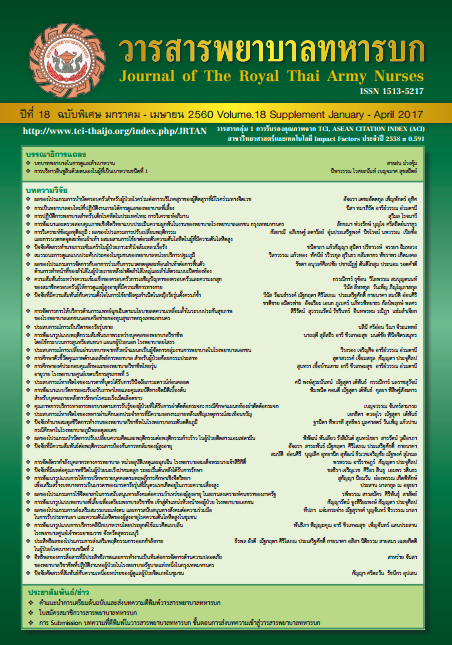การเผชิญปัญหาของครอบครัวและความผาสุกของสมาชิกครอบครัวผู้ให้การดูแลผู้สูงอายุที่มีความพิการทางกาย
Keywords:
ความเข้มแข็งของครอบครัว, การเผชิญปัญหาของครอบครัว, ความผาสุกของครอบครัว, การคืนสภาพครอบครัว, ความพิการทางกาย, family hardiness, family coping, family well-being, Resiliency Model, physical disabilityAbstract
การวิจัยครั้งนี้มีวัตถุประสงค์เพื่อศึกษาความสัมพันธ์ระหว่างความเข้มแข็งของครอบครัว การเผชิญปัญหาของครอบครัวและความผาสุกของสมาชิกครอบครัวผู้ให้การดูแลผู้สูงอายุที่มีความพิการทางกาย โดยใช้แนวคิดการคืนสภาพของครอบครัว กลุ่มตัวอย่างเป็นสมาชิกครอบครัวผู้ให้การดูแลผู้สูงอายุที่มีความพิการทางกาย และเป็นผู้พาผู้สูงอายุมารับการรักษาแบบผู้ป่วยนอกในโรงพยาบาลศิริราช จำนวน 88 ราย เก็บรวบรวมข้อมูลโดยใช้แบบสอบถามข้อมูลส่วนบุคคลของผู้สูงอายุและสมาชิกครอบครัวผู้ให้การดูแล แบบประเมินการทำกิจวัตรประจำวันพื้นฐานของผู้สูงอายุ แบบวัดความเข้มแข็งของครอบครัว แบบวัดการเผชิญปัญหาของครอบครัว และแบบวัดความผาสุกของสมาชิกครอบครัว วิเคราะห์ข้อมูลโดยใช้สถิติบรรยายและวิเคราะห์ความสัมพันธ์โดยใช้สถิติสหสัมพันธ์ของเพียร์สัน ผลการวิจัยพบว่ากลุ่มตัวอย่างรับรู้ความเข้มแข็งของครอบครัวระดับสูง (Mean = 44.14, SD = 11.27) รับรู้การเผชิญปัญหาของครอบครัวระดับปานกลาง (Mean = 94.10, SD = 11.03) รับรู้ความผาสุกของครอบครัวระดับปานกลาง (Mean = 54.34, SD = 12.03) ความเข้มแข็งและการเผชิญปัญหาของครอบครัวมีความสัมพันธ์ทางบวกกับความผาสุกของสมาชิกครอบครัวผู้ให้การดูแลผู้สูงอายุที่มีความพิการทางกายอย่างมีนัยสำคัญทางสถิติ (r = .598, p < .01) และ (r = .538, p < .01) ตามลำดับ ผลการวิจัยครั้งนี้ สามารถใช้เป็นแนวทางประเมินครอบครัวผู้สูงอายุที่มีความพิการทางกาย โดยเน้นครอบครัวให้มีความเข้มแข็ง พร้อมที่จะเผชิญปัญหาและอุปสรรคต่างๆ เพื่อให้ครอบครัวสามารถปรับตัวต่อความเครียดและคงไว้ซึ่งความผาสุกในชีวิต
Relationship Between Family Hardiness, Family Coping and Well-being of Family Members of Elders with Physical Disability
This study was a descriptive correlation research aiming to explore family hardiness, family coping and well-being of family members of elders with physical disability. The Resiliency model was used as the conceptual framework for this study. The subjects consisted of 88 family members who cared for elders with physical disabilities and visiting at Outpatient department in Siriraj Hospital. Data were collected by using a demographic characteristic questionnaire, Barthel ADL index, Family hardiness index, Family crisis oriented personal evaluation scales, and Family member well-being index. Data were analyzed using descriptive statistics and Pearson’s product moment correlation. The findings revealed a high level of family hardiness (Mean = 44.14, SD = 11.27), a moderate level of family coping (Mean = 94.10, SD = 11.03), and a moderate level of family member well-being. (Mean = 54.34, SD = 0.59) The analysis relationships revealed family hardiness and family coping are positive relations for well-being of family member of elders with physical disability which statistical significance (r = .598, p < .01) and (r = .538, p < .01) respectively. The results can be applied as guidelines to assess family members who care for elders with a physical disability. By promoting family hardiness and family coping with problems and obstacles. So family members can adapt to stress and maintain well-being in their life.
Downloads
How to Cite
Issue
Section
License
บทความหรือข้อคิดเห็นใดใดที่ปรากฏในวารสารพยาบาลทหารบกเป็นวรรณกรรมของผู้เขียน ซึ่งบรรณาธิการหรือสมาคมพยาบาลทหารบก ไม่จำเป็นต้องเห็นด้วย
บทความที่ได้รับการตีพิมพ์เป็นลิขสิทธิ์ของวารสารพยาบาลทหารบก
The ideas and opinions expressed in the Journal of The Royal Thai Army Nurses are those of the authors and not necessarily those
of the editor or Royal Thai Army Nurses Association.





